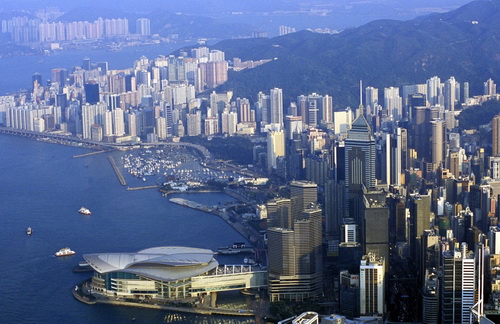-
News >Bizchina
'HK seeks a new identity'
2010-06-28 09:07Former British colony urged to rely less on financial services sector
HONG KONG - Celebrating someone's birthday is a Champagne time - but engineering his or her rebirth certainly isn't.
This is the way Hong Kong is at the moment - marking the 13th anniversary of Britain's hand over of the territory to China while desperately seeking a new identity in a rapidly changing country at a rapidly changing time.
The city, or rather the Hong Kong Special Administrative Region, has been one of the most successful economies in Asia.
But now, due partly to the worldwide recession and partly to China's greater openness to global business, weaknesses seem to be mounting below its glamorous surface.
While Shanghai, seen as a rival financial city, has become a bigger economy than Hong Kong, there is increasing concern about the SAR's over-reliance on services - particularly its financial sector - which make up some 88.6 percent of the economy, according to the Hong Kong census and statistics department.

Fang Zhou, assistant chief research officer at One Country Two Systems Research Institute, said HK was one of the most service-sector dependent economies.
The unbalanced nature of the economy is beginning to weigh heavily on its citizens, faced with ever-spiraling property prices.
The newspaper job advertisements are dominated by sales vacancies, often on commission-based remuneration, little reward for graduates coming out of Hong Kong's world-class universities.
Fang Zhou, assistant chief research officer of the think tank One Country Two Systems Research Institute (OCTSRI), based on the 61st floor of the gleaming Bank of China building in Central district, says there is a challenge.
"Hong Kong is one of the most service-sector dependent economies in the world and some people say it is a real weakness. It makes us extremely vulnerable and that has been the case over the last two years with the economic crisis affecting financial institutions," he said.
Although the economy contracted by 3.1 percent in 2009, Hong Kong's financial services sector has proved more resilient than other financial centers such as London and New York. The forecast for growth this year is 4 to 5 percent in real terms.
The Hong Kong SAR government is to some extent now trying to turn back the clock and diversify the economy. As a result of policies pursued in the 1980s to shift production of goods to the mainland and, in particular, Shenzhen over the border, manufacturing now makes up only 2.5 percent of the economy.
The SAR's chief executive, Donald Tsang, is intent on fostering six new sectors of the economy in such areas as education services, state-of-the-art hospitals aimed at mainlanders, testing and certification services, environmental industries, innovation and technology, and creative industries. Precious land and funding is being made available to develop these.Michael McCool, the principal at international management consultants AT Kearney's Hong Kong base in Wan Chai, is skeptical such a diktat approach will work.
"A feature of Hong Kong is the quantity of business done by small- to medium-sized entrepreneurs. Walk into any office block and there are four or five businesses on any floor. They will decide what Hong Kong's new industries are.
They will see opportunities and others will follow. They won't move somewhere by central decree," he said.

